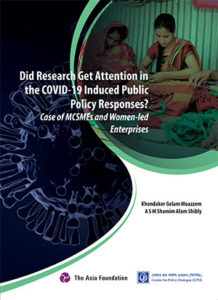Case of MCSMEs and Women-led Enterprises
 This study focuses on the relationship between public policies and research during the Covid pandemic period in addressing the challenges of the marginalised businesses, particularly for SMEs and women-led enterprises, in getting access to financial support (i.e., stimulus loan packages). Theoretically, a knowledge-based policy formulation process generates a policy space where actors and institutions, politics and interests, narratives and evidence intersect altogether. Incorporating these three factors in the context of a developing country is challenging, particularly for the marginalised businesses, since their participation in the policy space is minimal. The study postulates that the large scale actors and institutions (i.e., business associations and chamber of commerce at the national level) can influence the policy space related to the packages of financial support due to their proactiveness and involvement in the decision making process. On the other hand, opportunities for SMEs and women-led enterprises to avail subsidised stimulus loan packages are rather bleak. Lack of effective role of the above mentioned three factors in addressing challenges of the SMEs and women led enterprises, such as inadequate attention from the policymakers, unequal scope for participation in the policy space, and inability of researchers in addressing specific difficulties of the marginalised businesses, has impeded their access to the stimulus loan packages during the pandemic period.
This study focuses on the relationship between public policies and research during the Covid pandemic period in addressing the challenges of the marginalised businesses, particularly for SMEs and women-led enterprises, in getting access to financial support (i.e., stimulus loan packages). Theoretically, a knowledge-based policy formulation process generates a policy space where actors and institutions, politics and interests, narratives and evidence intersect altogether. Incorporating these three factors in the context of a developing country is challenging, particularly for the marginalised businesses, since their participation in the policy space is minimal. The study postulates that the large scale actors and institutions (i.e., business associations and chamber of commerce at the national level) can influence the policy space related to the packages of financial support due to their proactiveness and involvement in the decision making process. On the other hand, opportunities for SMEs and women-led enterprises to avail subsidised stimulus loan packages are rather bleak. Lack of effective role of the above mentioned three factors in addressing challenges of the SMEs and women led enterprises, such as inadequate attention from the policymakers, unequal scope for participation in the policy space, and inability of researchers in addressing specific difficulties of the marginalised businesses, has impeded their access to the stimulus loan packages during the pandemic period.
Authors: Khondaker Golam Moazzem and A S M Shamim Alam Shibly
Publication period: May 2022


